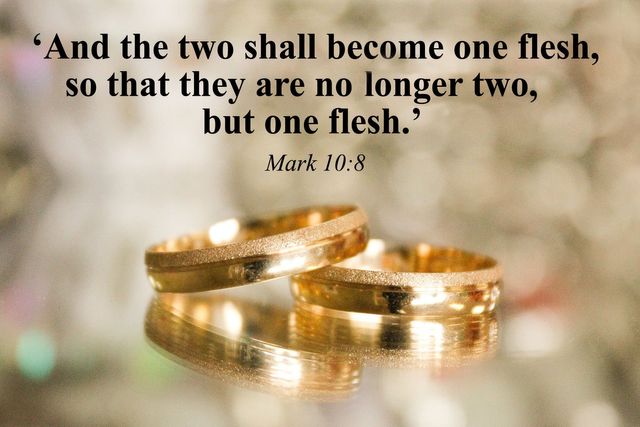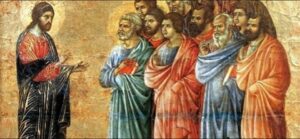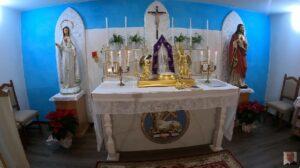
Now they are no longer two, but one flesh
ORARI S.MESSA DI OGGI SABATO 5 FEBBRAIO 2022, ORE 8.00 – S. Agathæ Virginis et Martyris ~ III. classis
Tempora: Sabbato infra Hebdomadam IV post Epiphaniam
S.MESSA ONLINE DI DON ENRICO RONCAGLIA, su youtube channel:
https://www.youtube.com/channel/UCYYDj4O4e11cE7XNtngkoJA e qui:
RIFERIMENTO: Gruppo FB Catena di Preghiera del Piccolo Resto https://www.facebook.com/groups/266287024711787
LITURGIA IN LATINO\ENGLISH:
https://divinumofficium.com/cgi-bin/missa/missa.pl
COMMUNIO PREGHIERE\PRAYERS:
https://www.proselitismodellascienza.it/2021/10/25/communio-e-comunione-spirituale/
EVANGELIUM E OMELIA\HOMILY:
Evangelium
Matt 19:3-12.
In illo témpore: Accessérunt ad Iesum pharisǽi, tentántes eum et dicéntes: Si licet hómini dimíttere uxórem suam quacúmque ex causa? Qui respóndens, ait eis: Non legístis, quia, qui fecit hóminem ab inítio, másculum et féminam fecit eos? et dixit: Propter hoc dimíttet homo patrem, et matrem, et adhærébit uxóri suæ, et erunt duo in carne una. Itaque iam non sunt duo, sed una caro. Quod ergo Deus coniúnxit, homo non séparet. Dicunt illi: Quid ergo Móyses mandávit dare libéllum repúdii, et dimíttere? Ait illis: Quóniam Móyses ad durítiam cordis vestri permísit vobis dimíttere uxóres vestras: ab inítio autem non fuit sic. Dico autem vobis, quia, quicúmque dimíserit uxórem suam, nisi ob fornicatiónem, et áliam dúxerit, mœchátur: et qui dimíssam duxerit, mœchátur. Dicunt ei discípuli eius: Si ita est causa hóminis cum uxore, non expedit nubere. Qui dixit illis: Non omnes cápiunt verbum istud, sed quibus datum est. Sunt enim eunúchi, qui de matris útero sic nati sunt; et sunt eunúchi, qui facti sunt ab homínibus; et sunt eunúchi, qui seípsos castravérunt propter regnum cœlórum. Qui potest cápere, cápiat.
Gospel
Matt 19:3-12
At that time, there came to Jesus some Pharisees, testing Him, and saying, Is it lawful for a man to put away his wife for any cause? But He answered and said to them, Have you not read that the Creator, from the beginning, made them male and female, and said, ‘For this cause a man shall leave his father and mother, and cleave to his wife, and the two shall become one flesh’? Therefore now they are no longer two, but one flesh. What therefore God has joined together, let no man put asunder. They said to Him, Why then did Moses command to give a written notice of dismissal, and to put her away? He said to them, Because Moses, by reason of the hardness of your heart, permitted you to put away your wives; but it was not so from the beginning. And I say to you, that whoever puts away his wife, except for immorality, and marries another, commits adultery; and he who marries a woman who has been put away commits adultery. His disciples said to Him, If the case of a man with his wife is so, it is not expedient to marry. And He said, ‘Not all can accept this teaching; but those to whom it has been given. For there are eunuchs who were born so from their mother’s womb; and there are eunuchs who were made so by men; and there are eunuchs who have made themselves so for the sake of the kingdom of heaven. Let him accept it who can.
DALL’OMELIA DI (FROM THE HOMILY BY) DON ENRICO RONCAGLIA – SABATO 5 FEBBRAIO 2022, ORE 8.00

Riferimento: https://www.revelationvirgo.org/2022/02/04/1170/
DALL’OMELIA DI DON ENRICO RONCAGLIA (*)
Cor 1:26-31.
Fratelli: Considerate la vostra vocazione Tra di voi , pochi sono i sapienti di sapienza umana, pochi i potenti, pochi i nobili; ma Dio ha scelto coloro che il mondo dice stolti per confondere i sapienti, e coloro che il mondo chiama deboli a confusione dei forti. Or è per Lui che voi siete in Cristo Gesù, il quale da Dio è stato fatto per noi sapienza e giustizia e santificazione e redenzione, affinché, come sta scritto: «Chi si vanta, si vanti nel Signore».
Matt 19:3-12.
In quel tempo si accostarono a Gesù dei Farisei per tentarlo, e gli dissero: «È lecito all’uomo ripudiare, per un motivo qualsiasi, la propria moglie?». Ed egli rispose loro: «Non avete letto che il Creatore da principio li creò maschio e femmina; e disse: “Per questo l’uomo lascerà il padre e la madre e si unirà con la moglie e i due saranno una sola carne”?
Gesu ci presenta le due vocazioni principali: il matrimonio e la consacrazione.
Anche nel matrimonio la legge e’ severa. Non e’ come quella del mondo, ovvero delle persone che non hanno fede in Lui e nemmeno quella degli ebrei del suo tempo che seguivano una legge (istituita da Mose’) che permetteva il divorzio. Cio’ proprio a causa della durezza del cuore.
Mentre invece il Signore viene a portare sulla terra un fuoco di carita’ , di amore e di grazia che noi riceviamo dai sacramenti. Quindi Gesu’ esige di piu’ dai cristiani e dai suoi discepoli. Proprio perche’ hanno i mezzi per portare a compimento la Legge del Signore.
Come era, del resto, sin da principio. Infatti ricevono quella grazia che li puo’ portare alla completa fedelta al Signore. In piu’ nel cristianesimo, rispetto alle altre culture e alla Legge antica, e’ contemplata una seconda possibilita’: cioe’ di rinunciare al matrimonio per consacrarsi al Signore, in vista del Regno dei Cieli. Cosicche la vita del consacrato, del sacerdote che si consacra a Dio, o del religioso o della religiosa, e’ una vita che in qualche modo anticipa quello che vivremo nell’aldila’. Cio’ che sara’ per tutti nel Paradiso, ovvero una vita casta. Questa seconda vocazione non e’ per tutti. Infatti, dice il Signore, e’ per coloro che possono capirla. Il Signore illumina la mente e il cuore di alcune persone perche’ siano facilitate a seguire il Signore e possano seguire questa strada straordinaria.
Oggi ricordiamo Sant’Agata (229 / 235 – Catania, 5 febbraio 251), una giovane catanese vissuta nel III secolo. Fu messa a morte, appunto a Catania, durante la persecuzione di Decio (249-251), per non avere mai tradito la professione della sua fede cristiana. Dopo la Vergine Maria, è una delle sette vergini e martiri ricordate nel canone della Messa. Essendo morta vergine e martire ha potuto godere di due vocazioni, quella della verginita e del martirio, la morte per Cristo. Sant’Agata e’ protettrice di Catania e contro le eruzioni dell’Etna.
Quello che importa e’ che ciascuno risponda alla propria vocazione in piena liberta’.
Cosi, in particolare, il matrimonio deve essere libero. Il Signore ama la liberta dei suoi figli.
Ma se c’e’ la liberta c’e’ anche l’affetto. Cosi ogni atto deve essere dettato dall’amore e dalla carita.
Sia lodato Gesu’ Cristo! Sempre sia lodato!
__________________
(*) Questo commento e’ scritto in tempo reale durante l’omelia. Mi scuso per l’eventuale misinterpretazione delle parole di Don Enrico.
FROM THE HOMILY BY DON ENRICO RONCAGLIA (**)
Cor 1: 26-31. Brothers: Consider your vocation Among you, few are the wise men of human wisdom, few are powerful, few are noble; but God has chosen those whom the world says foolish to confuse the wise, and those whom the world calls weak to confuse the strong. Now it is through him that you are in Christ Jesus, who by God has been made for us wisdom and justice and sanctification and redemption, so that, as it is written: “Whoever boasts, may boast in the Lord”.
Matt 19: 3-12. At that time they approached Jesus of the Pharisees to tempt him, and they said to him: “Is it lawful for a man to divorce his wife for any reason?”. And he answered them, ‘Did you not read that the Creator from the beginning created them male and female; and said: “This is why man will leave his father and mother and unite with his wife and the two will be one flesh”?
Jesus presents to us the two main vocations: marriage and consecration. Even in marriage, the law is strict. It is not like that of the world, that is, of people who do not have faith in him and not even that of the Jews of his time who followed a law (instituted by Moses) that allowed divorce.
This is precisely because of the hardness of the heart. Instead, the Lord comes to bring to earth a fire of charity, love and grace that we receive from the sacraments. Therefore Jesus demands more from Christians and from his disciples. Precisely because they have the means to carry out the Law of the Lord.
As it was, moreover, from the beginning. In fact, they receive that grace that can lead them to complete faithfulness to the Lord.
In addition, in Christianity, compared to other cultures and the ancient law, a second possibility is contemplated: that is, to renounce marriage to consecrate oneself to the Lord, in view of the Kingdom of Heaven.
Thus the life of the consecrated person, of the priest who consecrates himself to God, or of the religious, is a life that somehow anticipates what we will live in the afterlife. What will be for everyone in Paradise, that is, a chaste life.
This second vocation is not for everyone. In fact, the Lord says, it is for those who can understand it. The Lord enlightens the minds and hearts of some people so that they are facilitated to follow the Lord so that they can follow this extraordinary path.
Today we remember Sant’Agata (229/235 – Catania, 5 February 251), a young woman from Catania who lived in the third century. She was put to death during the persecution of Decius (249-251) in Catania, for never having betrayed the profession of her Christian faith. After the Virgin Mary, she is one of the seven virgins and martyrs mentioned in the canon of the Mass. Having died a virgin and a martyr, she was able to enjoy two vocations, that of virginity and martyrdom, death for Christ. Sant’Agata is the protector of Catania and against the eruptions of Etna.
What matters is that everyone responds to their vocation in full freedom.
Thus, in particular, marriage must be free. The Lord loves the freedom of his children. But if there is freedom, there is also affection. Thus every act must be dictated by love and charity.
Praised be Jesus Christ! Always be praised!
__________________
(*) This comment is written in real time during the homily. I apologize for any misinterpretation of Don Enrico’s words.

